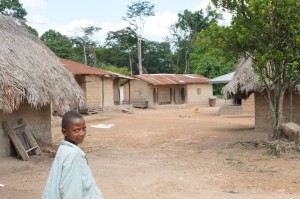
This past year, the Ebola death toll rose to over 4,600, mainly in West Africa, according to the Center for Disease Control. Despite this, Jonathan Gomez, a third year business and engineering major, spent two months of his co-op cycle in Sierra Leone, one of the countries struck hardest by the outbreak hitting the region. Sierra Leone is located just south of Guinea on the Western coast of Africa with a population of six million.
Gomez became interested in traveling to Sierra Leone for his co-op in the previous fall, after overhearing his instructor talking about the opportunity of working in the developing country. His instructor, former assistant clinical professor of Decision Sciences, Neil Desnoyers was to be the supervisor of the program in Sierra Leone.
“I was interested because I had never traveled before. It would have been my first time traveling outside the country and even outside of the tri-state area pretty much. I decided that I wanted to branch out. I wanted to try something new. I wanted to gain new perspectives on life,” Gomez said.
Gomez also spoke about his personal interest in Sierra Leone, because he himself grew up in poverty. “So, I wanted to see what poverty would be like in Sierra Leone [compared to] the United States, specifically in Philadelphia,” he said.
According to Peter Franks, Vice Provost for career education, students had been in 49 different countries across the world in the previous year, with more opportunities to increase as President Fry continues with his strategic plan.
“[In case of emergencies], we have in-place systems to get [students] out of there,” Franks continued. “[We] take very very seriously the health and safety of students.”
“We’re actually on the conservative side… I’d rather be more conservative than less conservative if there’s any question about a location for health issues or emergency issues or political kinds of things,” Franks said.
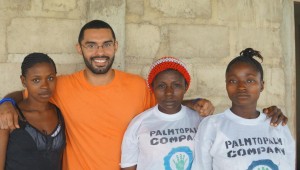
The co-op was research and business based with a company called Palm to Palm, a palm oil and soap company that sold its products to the people of the Kono District, an eastern region of Sierra Leone that sits on the border of Guinea, where the outbreak occurred. The program started two years ago with enough funding to run until the end of the current co-op cycle — part of it taking place in Drexel and part of it in Sierra Leone. The main contact between Sierra Leone and Drexel was facilitated by Raphael Frankfurter, executive director of a clinic called the Wellbody Alliance in the Kono district.
The co-ops for developing countries often take a much more extensive application process, usually involving interviews at the International Co-op Program, two other offices, then the organization and then mandatory training throughout the winter term for things such as vaccinations and other health safety issues. For Gomez, he had to be interview by his supervisor as well as the Wellbody Alliance.
“We look for maturity, we look for other experiences that could somehow correlate. In this case, it was the perfect example of we picked the perfect student. He handled it with maturity and adaptability,” Tess Smith, manager of the International Co-Op Program, said.
Gomez had to be trained with Desnoyers, which included Gomez writing a 14-page research paper on the Ebola virus.
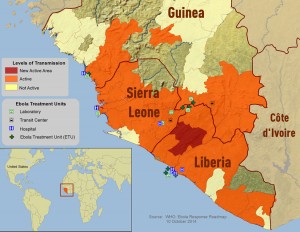
The current outbreak of Ebola began in December 2013 when a two-year-old child in southern Guinea became infected with the virus and died. It remained isolated in southern Guinea until February when a healthcare worker brought it to a neighboring province and died. The disease was officially confirmed to be Ebola in March after 87 infections, with 61 deaths. On March 31 Liberia, a country just south of Guinea and Sierra Leone, confirmed their first two cases of the virus.
Two months later, on May 26, Sierra Leone, confirmed their first deaths from the virus after a tribal healer brought it into the country.
Drexel became aware of the outbreak in March and has followed it ever since.
“We waited to see if anything had evolved,” Smith said, “because with Africa, you never know. Things change all the time.” The university monitored state department alerts, CDC alerts and other disease monitoring organizations. In case of emergencies, the University has insurance in place to evacuate students at any point in time.
According to Franks, the managers of the International Co-op Program constantly check for when things might go wrong in a country where co-op is located. “For example, Israel, we have some students that were going to go there in the fall, but because of what was happening in that country — which had nothing to do with health and everything to do with missiles flying there — we pulled all those jobs,” he said. Franks went on to institute a ban until things settle in Israel. There is now currently a ban on all co-ops in the West African region as well until the outbreak dies down.
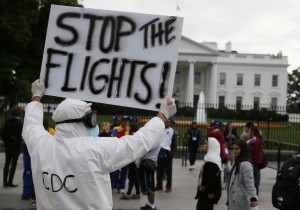
The original flight date for Gomez was pushed back once there were confirmed cases of Ebola that began to show itself in Sierra Leone. It was pushed back a month later, which then got pushed back further when the outbreak continued to worsen in Sierra Leone. In June the outbreak had slowed to no new cases of Ebola for 21 days, which gave the University the confidence to allow Gomez to fly back on June 10 with Frankfurter, who kept updates on the conditions on the ground.
The main fears that Gomez had were about how to get back if the outbreak worsened and how to avoid traveler’s diarrhea, which he ended up getting once during his last week.
Gomez ended up being the only one out of his team to actually go to Sierra Leone, as well as the only Drexel student on co-op in the entire region. Desnoyers and the one other co-op student remained in the U.S. in order to pursue the research portion of the project. He also worked as a director of the company, helping the business flourish during his time there. Gomez, however, did keep in contact with them weekly to update them on progress of Palm to Palm and answer other questions.
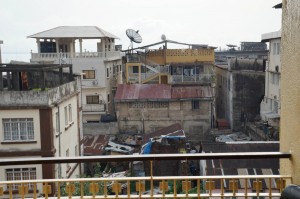
“Words do not fully describe the area; it is really one of those places that you would have to see for yourself to believe. In short, however, abject poverty,” Daniel Pinto, the student who previously had experienced this co-op the year prior, wrote in an e-mail. “Most people in my area, especially outside of the city, lived in mud huts with thatched roofs or possibly sheet metal shacks. They slept on mats and would retrieve their daily water from the nearest stream or water pump, sometimes miles away, especially in the bush villages.”
Gomez stayed until early August, returning to the U.S. to present on all of the work he had done for Smith and Franks.
The company had a staff of under ten people by the time Gomez had become a part of the company and when Gomez had left, it had increased to 14 people and its production had increased by 300 percent. He also advertised for the company, representing them on two radio stations.
Gomez lived in a “guest house,” that was considered much more upper class to the surrounding conditions. Yet, he still had to disinfect the water by boiling it or irradiating it with UV light and he only had electricity for only certain hours of the day, which further limited his already extremely restricted access to the Internet, cutting off much of his connection back to the States.
Gomez also shared his living quarters with members of the Wellbody Alliance, which allowed him to get updates on the spread of the Ebola virus, learning more of how it continued to get closer and closer to the Kono district.
Working 11 hours a day, six days a week, Gomez spent most of his time at the company striving to help it grow, often times talking and getting to know his coworkers.
For fun, Gomez often went into the city to local restaurants. Gomez also got to know the local people, including a group of boys that lived in the village with whom he often played soccer and wrestled
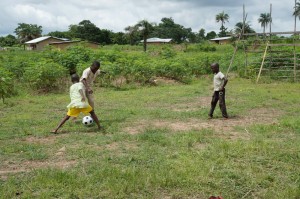
“Sometimes, we would go into town and I would buy them food because they didn’t have food or their parents couldn’t buy food for them that day. We would get some together,” Gomez said, “I asked someone there, ‘How often do you get a day that you don’t get to eat?’ At least once a month, there’s a day where they don’t get to eat food, but most days they eat at least about two meals.”
Over 50 percent of the population lives below the poverty line in Sierra Leone, according to World Bank, with a life expectancy of 45 years. According to Gomez, the food in Sierra Leone general consisted of very spicy fish, rice and mashed up vegetables, cooked on a pan over hot coals. Most of the time, however, he would go buy his food, frequently costing around a dollar.
When talking about the spread of Ebola, Gomez often found that people tended to joke about the illness or didn’t believe it existed.
“[People believed] that the Americans or Westerners created it and they’re just trying to scare people,” Gomez said. “They thought we were against them.”
“A lot of the conversations at work would be like, ‘Oh, Ebola exists.’ And they’d be like, ‘No, it doesn’t. People have been dying here. People have always been dying here. They’re going to die here. They’re going to die in the future. It’s nothing different. This is the same thing we’ve had before,’” Gomez continued.
The three leading causes of death for children under five in Sierra Leone are diarrhea, pneumonia and malaria, according to the World Health Organization.
“I attended two funerals for people that I had met while there, one of them I had dinner with just three days earlier,” Pinto wrote in an e-mail. “Though there is a period of grieving, life carries on and there is not really a sense of ‘fear’ of death, if you know what I mean. It is just unbelievably and unfortunately commonplace there.”
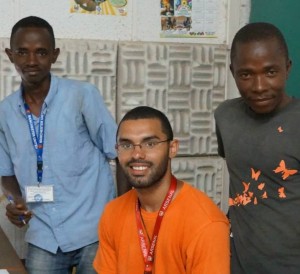
One of the other conversations Gomez had involved the consumption of infected bush meat, which is a major cause of the spreading of the virus. His coworkers claimed that it hadn’t made them sick before, so there was no reason for them to get sick now. According to Gomez, there were even some doctors that ate bush meat during the spread in Sierra Leone.
However, as the spread of Ebola became more serious, precautions became more prominent. The restaurants that he would go into town for began to require customers washed their hands in water mixed with chlorine before entering. Servers were required to wear gloves while serving food.
The government, according to Gomez, had a large campaign to inform the people about the threat of Ebola, with several boards, flyers and other ways to warn people of the sign of Ebola and the mode of infection.
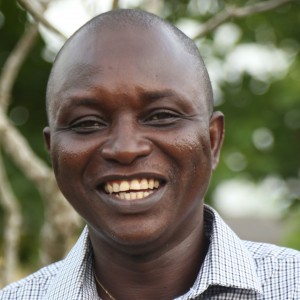
“On July 29, everything changed,” Smith said, “There had been an unconfirmed cased in the Kono district.” July 29 was the same day that Sierra Leone’s only expert on hemorrhagic fevers, Dr. Sheik Umar Khan, had died from the virus in Kenema, the district just south of Kono.
Without time to say good-bye to his coworkers or the people he had met there, Gomez, Frankfurter and a few other employees took a private car to Freetown, the capital of Sierra Leone, to never go back.
The once weekly updates for Gomez turned to daily updates, in order to make sure that the situation did not go further out of control. On July 31, CDC upgraded the alert level to three, with cases skyrocketing too close to Kono to return. In the U.S., Smith and Desnoyers had been working very hard to organize the flight back for Gomez.
They finally understood the seriousness of the threat when the Peace Corp that had been stationed in Kono was evacuated. It was then that Frankfurter decided that they would definitely leave.
It was in August that Ebola truly hit the mass media when two United States missionaries were evacuated from Liberia after they became infected. They were treated and released a couple weeks later.
The main concern Gomez had under the threat of Ebola was that flights from Sierra Leone would have be suspended, forcing him to travel to an entirely differently country in order to return back to America. “I was really stressed out when British Airlines had canceled their flights,” Gomez said, but at no point did Gomez fear being infected by Ebola. Gomez had taken Brussels Airlines to return back to America.

As the date for their flight approached, they took another private car to another beach hotel on the island that had Sierra Leone’s only airport.
When it was time for his flight, Gomez was screened for signs of the virus, mostly through a simple temperature check. He was also screened in Brussels before going back to the U.S. Gomez returned Aug. 10 after a 36-hour flight. It was only a couple days that he had been back in America that Gomez had come down with an illness.
“I wasn’t afraid that I had Ebola, I was afraid that people would think that I had Ebola,” Gomez said.
The inflammatory media attention that the Ebola outbreak had received since Aug. had caused most people to become hyper vigilant and cautionary towards anyone who had returned or was from West Africa. It did not help in Gomez’s case that he fell ill so soon after he had returned.
Friends and relatives refused to see Gomez after he had returned, in fear that he might possibly infect them. Gomez’s roommate actually moved out to avoid the risk of getting infected.
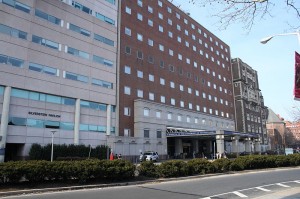
Gomez was only sick for less than an entire day, being nursed and helped by his girlfriend. The following day, Gomez went to the emergency room at the hospital at the University of Pennsylvania where he went into a special emergency room with purified air. He went through some blood tests and X-ray before he was cleared.
After being cleared by the hospital, his loved ones felt more comfortable.
It was in late in Aug. that all the airlines suspended their travel. Senegal, a country just north of Guinea confirmed its first case in the last days of Aug. as well.
The death toll would double in the following month of Sept. Sierra Leone would have a three-day shutdown in order to prevent the spread of the virus within their own borders. A Liberian man named Thomas Duncan was hospitalized in Texas Sept. 30, becoming the first person diagnosed in the U.S. He later died in Oct. Two of the healthcare workers helping him became infected as well.
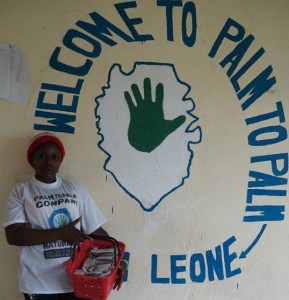
The media attention that has followed the outbreak was one of the main causes of flight suspension that Gomez feared during his stay in Sierra Leone. He also expressed concerns that the media attention would cause economic problems for the country that was already struggling to improve. “Their main source of income is from selling products that are imported. If we start stopping people from going to their country, if we stop trading with their country, can you imagine how many people are going to die just from that alone,” Gomez said, stating that the worry would hurt Sierra Leone more than it would help the U.S.
During his stay in Sierra Leone, Gomez witnessed the prices of certain imported products was starting rise, as the threat of Ebola caused more restrictions on trade. Gomez felt the effects of Ebola on the economy through the product manager of Palm to Palm with whom he kept in contact with, who complained about Ebola affecting their business.
“I feel like [the media coverage] was really blown out of proportion. I see a lot of people posting up facts about Ebola — about how it’s not airborne or whatever and I really respect those people,” Gomez said, “I think people are getting this impression that it’s really highly dangerous virus. That it’s really really deadly. I feel like they’re getting the impression that if you’re in the area at all, then you’re definitely going to get the virus.”
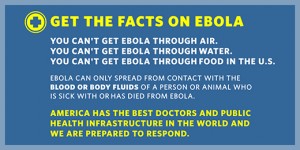
“The only people who get it right now,” Gomez said, “are people who are doctors, nurses, because those are the people that are directly handling the patients, who are directly handling the body fluids.”
Pinto also expressed his frustration with the stigma surrounding Ebola in the U.S. “I hate the fact that the death of thousands of poverty stricken people has once again been turned into a media sideshow act, causing completely unfounded fear that even had effects on our economy,” Pinto wrote. “I have seen the deaths of people I knew and worked with flippantly turned into a punch line by pop culture and an unfounded fear for [American] safety because of a disease we are completely prepared to contain.”
A week ago, a Haitian woman was seen vomiting with traces at a Boston train station. When emergency responders were called, they claimed a “Liberian woman” might have had Ebola, according to Boston Magazine. There are pages of articles of parents and people around the country pulling children out of school or denying contact with people who may look or be from countries afflicted with the outbreak.
Many news organizations have criticized the fear-mongering coverage of the Ebola outbreak, with CNN’s article Oct. 15 calling the paranoia “Fear-bola,” after weeks of coverage of people exposed to the virus in Texas and Fox News’ Shepard Smith calling the media’s response “hysterical” and “irresponsible” after their own coverage.
On Oct. 24, a physician who treated patients with Ebola in Guinea returned to New York City to confirmed to have Ebola. The situation is currently contained at Bellevue Hospital and there are slim chances of him spreading the infection.

